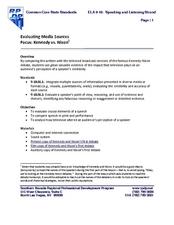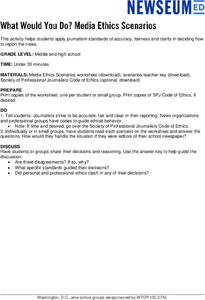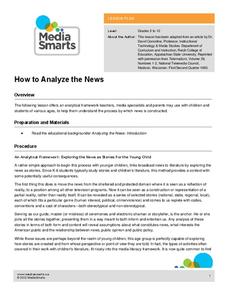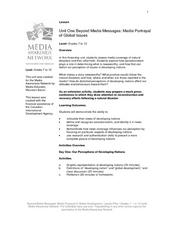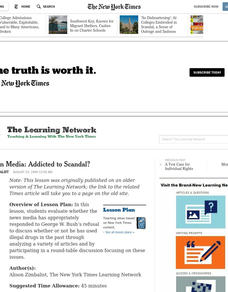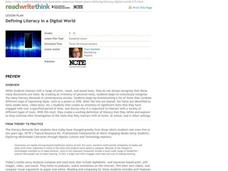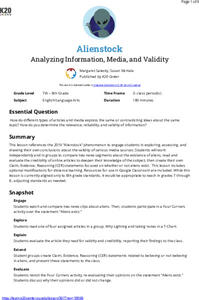Southern Nevada Regional Professional Development Program
Evaluating Media Sources
Just how much influence did television have on the results of the 1960 presidential election? Media critics contend that the results were all about how the two candidates appeared on the screen. Give your young historians a chance to...
Teaching Tolerance
Social Media for Social Action
Engage in activism, not slacktivism! Scholars discuss social media and the Internet as tools for social change. Next, they engage in a close reading strategy called Thinking Notes as they read an article about social media activism.
Newseum
What Would You Do? Media Ethics Scenarios
Young journalists are presented with scenarios that involve media ethics. They must decide in each case whether to cover the story, what they would cover, and if covered, what the angle would be.
The New York Times
Evaluating Sources in a ‘Post-Truth’ World: Ideas for Teaching and Learning about Fake News
The framers of the United States Constitution felt a free press was so essential to a democracy that they granted the press the protection it needed to hold the powerful to account in the First Amendment. Today, digital natives need to...
Ontario
Lesson Plan for Media Literacy
Fourth graders analyze posters that communicate an "active living" message, otherwise known as a public service announcement. Children identify techniques that are used in creating media texts including topic, purpose, and...
Open Oregon Educational Resources
Digital Foundations: Introduction to Media Design with the Adobe Creative Cloud, Revised Edition
How can Adobe Creative Cloud enhance digital art and media design? Readers explore just that with the Digital Foundations eBook. They learn how to source images and how to create symmetry and asymmetry in their digital designs. They also...
Museum of Tolerance
Developing Media Literacy
To protect young people from questionable content, many schools limit access. This resource suggests that because learners can so readily avail themselves to unrestricted Internet access, it is vital for 21st century learners to develop...
Media Smarts
How to Analyze the News
Teach kids how to watch television, specifically the news, with this creative idea for learners of all ages from the Media Awareness Network. The elementary school plan focuses on presenting news as a story and uses Jon Scieszka's story...
Curated OER
Beyond Media Messages: Media Portrayal of Global Issues
Take a close look at news reporting techniques and global issues. Begin by creating a graphic representation of developing nations and defining the term. After class discussion, the second day's activities pick up by deconstructing news...
iCivics
NewsFeed Defenders Extension Pack
Accuracy, transparency, trustworthiness, and impartiality are four unspoken rules of journalism. Scholars delve deep into the subject by discussing the pros and cons of relying on social media for news. They also play an online game to...
The New York Times
Crossing the Line Online: Sexual Harassment and Violence in the Age of Social Media - NYTimes.com
Sexual harassment and sexual violence are by no means new issues. What has changed is the role of social media in these issues. This powerful and troubling lesson uses a specific rape case to launch research into a discussion of the...
Curated OER
Using Print Media in the LCTL Classroom
Explore newspapers as a form of print media. They examine headlines from newspapers and infer meanings of the headlines. They skim articles for information and exchange articles between groups. They complete charts while skimming the...
Social Media Toolbox
Social Media Usage
Is there a difference in the way organizations present news via social media and in print? The third in a series of 16 lessons from The Social Media Toolbox explores news outlets and their delivery methods. Groups follow a story for a...
Teaching Tolerance
Media Consumers and Creators, What Are Your Rights and Responsibilities?
Teach the class to separate fact from fiction. Scholars explore the topic of fake news as they read PEN America's News Consumers' Bill of Rights and discuss the rights and responsibilities outlined in the bill. Next, they read an article...
Curated OER
Real Life Or Broken Mirror? Examining Media Representations of Teenagers
Students analyze representation of teenagers in the news and other media, discuss importance of media literacy in interpreting media portrayals of reality, and discuss and write about accuracy, or lack thereof, of media images of young...
Curated OER
How Media Shapes Perception
High schoolers analyze how media shapes their perception of events. In this media lesson, students research the home pages of assigned web sites to determine how media influences how they feel about tragic event. They look at head lines...
Curated OER
How Media Shapes Perception
Students explain the impact that the media may have in shaping their intellectual and emotional responses to current events. They examine broadcast and Web-based news sites to find subtexts through the use of language, audio, and visual...
Curated OER
American Media: Addicted to Scandal?
Students examine media coverage of George W. Bush's refusal to answer questions regarding past illegal drug usage in the 1999 campaign. They consider the role of rumor, scandal, audience and relevance in political media coverage.
Classroom Law Project
Should we believe everything we read? Becoming a discerning consumer of media
Class members investigate the role media should play in a healthy democracy. As part of this study, groups analyze political advertising, use FactCheck to assess not only the veracity of but the persuasions techniques used in candidates'...
ReadWriteThink
Defining Literacy in a Digital World
What skills are necessary to interact with different types of text? Twenty-first century learners live in a digital world and must develop a whole new set of skills to develop media literacy. Class members engage in a series of...
Curated OER
Darfur: Violence and the Media
Learners read an article on Darfur prior to class, discuss the conflict in Darfur, visit a series of websites, and complete a worksheet evaluating the reporting and sources used. They view films on genocide to decide if the Darfur...
Newseum
The Fundamentals of News
A short video introduces middle schoolers to different media-related news terms. Viewers then complete a worksheet and discuss the differences between news and journalism, between facts and opinions.
K20 LEARN
Alienstock: Analyzing Information, Media, And Validity
One only has to watch MSMBC and FOX News to realize that media can present the same story in very different ways. Middle schoolers have an opportunity to test their ability to determine the validity and trustworthiness of information by...
Media Smarts
Gender Messages in Alcohol Advertising
Make your learners critical consumers of media, and foster an awareness of how culture is reflected and shaped by media. This resource covers how alcohol advertising presents and promotes gender stereotypes. After a discussion on...
Other popular searches
- Mean, Median, Mode
- Media Education
- Communications and the Media
- Usa and World News
- Education News
- Mean Median Mode
- Printing Press
- Mediation
- Agriculture News
- News
- Median
- News Magazines


